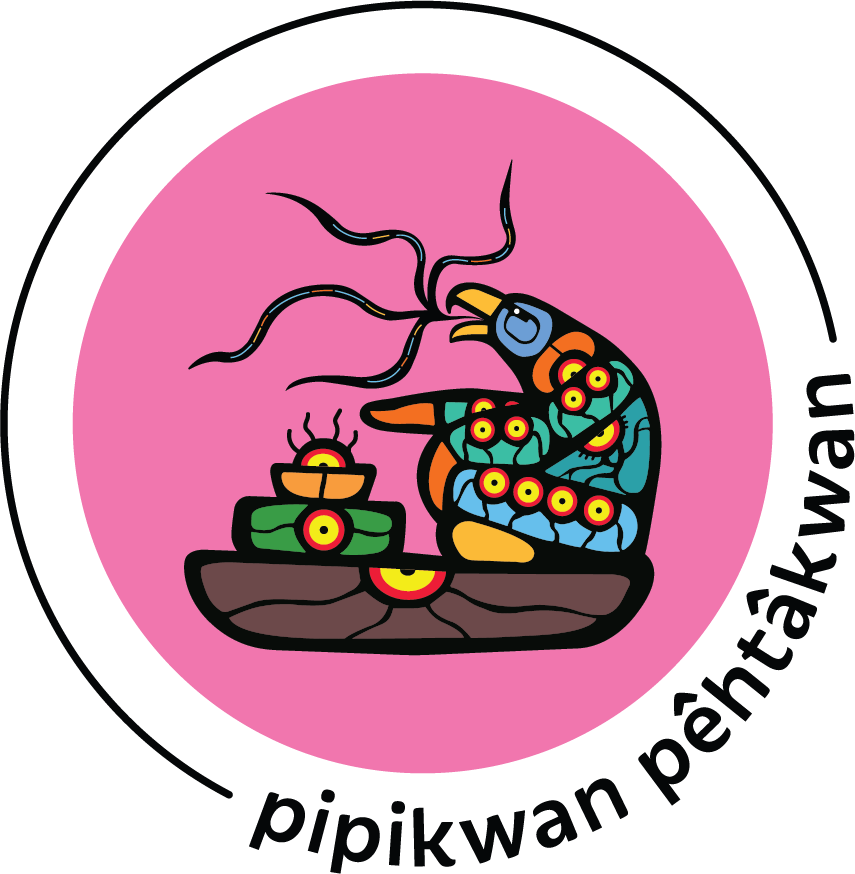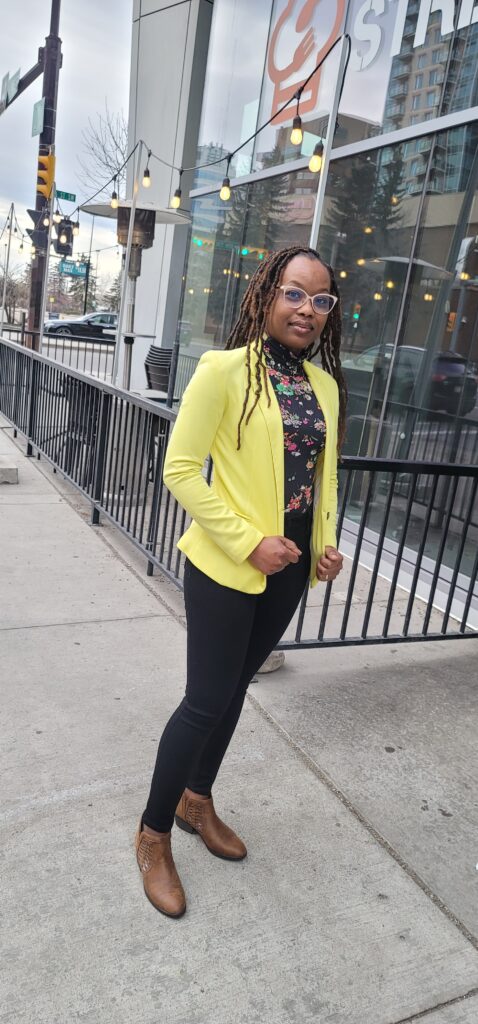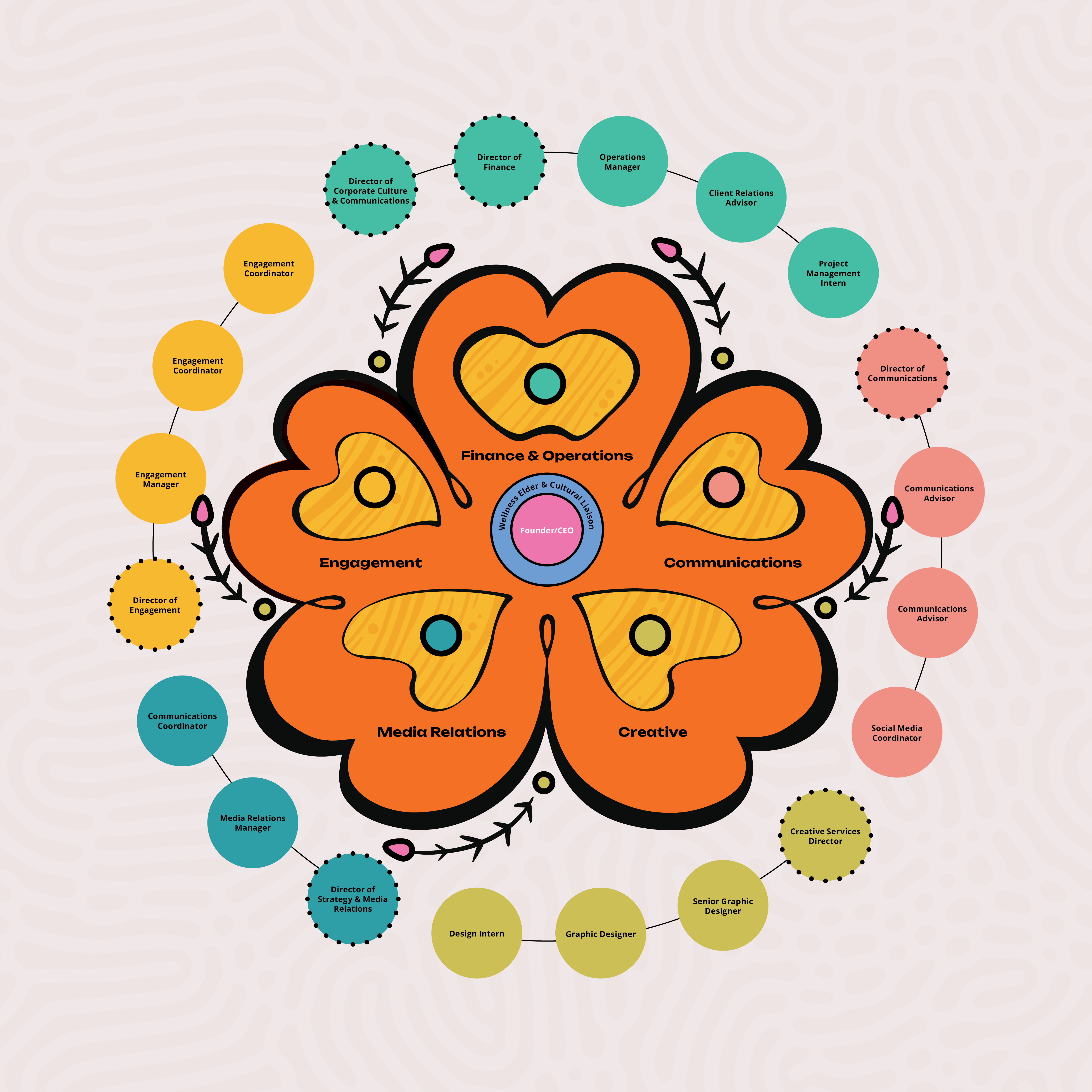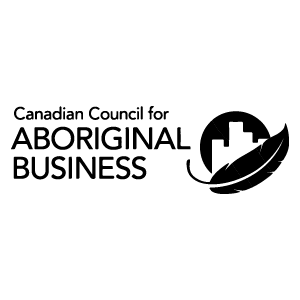My work ethic is based on building relationships, listening and understanding people’s experiences – not speaking for them, but supporting them in speaking their truths – providing space for them to start and join conversations about them.
Shawna-Kay Thomas is pipikwan pêhtâkwan’s Director of Corporate Communications and Culture and has been working with the company since January 2021.
Born and raised in Manchester, central Jamaica, Shawna-Kay is a graduate of the University of the West Indies, Mona (UWI), where she earned her Bachelor of Arts in Media and Communication, and Master of Science in Gender Development Studies. Mona Estate is a former sugarcane plantation given to British military officers from the Spanish colonizers of Jamaica in 1655. During World War II, the Estate was used to house approximately 1,500 Jewish and Gibraltarian refugees.
For Shawna-Kay, sometimes it can feel like the only escape from the pain of colonialism comes from education – formally through the education system and informally from the media.
“Growing up in Manchester with my family – whenever we were at home, the radio would blast throughout the day, and if not ours, it would be the neighbour’s” Shawna-Kay says. “We would listen to talk radio or the soothing sounds of reggae icons such as Garnet Silk, Luciano, Beres Hammond, Mighty Diamonds and more, with conscious messaging speaking about our connection to God, people and culture while chanting fire on systems of oppression and colonialism.” Shawna-Kay says she developed a love for radio because she wanted to hear people like her voice their opinion and provide perspectives on our past, present and future.
Shawna-Kay believes there are two main kinds of people in Jamaica– those who have been assigned power and those without power – in news coverage and life in general, we see how both are treated differently. “Radio allows those who have not been allowed to exercise power – often rural people, people with darker skin, who are not considered middle to upper-class to share their truths and talk about their experiences – I was drawn to that.”
A dynamic medium in Jamaica, radio is an authentic lesson in how language shapes identity. Shawna-Kay appreciated that folx on the radio were able to speak the native language of Jamaica, to provide vivid descriptions of legacies, life and leadership as they see it. A Creole language mixed with African Akan, Patois is spoken by the Jamaican diaspora all over the world. Patois was once considered substandard by colonizers but has recently started to reclaim its power as a distinct and beautiful native language. Through this expression of language coupled with the impacts of colonialism and privilege, Shawna-Kay was able to find commonalities with the Indigenous Peoples living in the land now known as Canada.
“Many of the stories I’ve heard are similar to my experiences from Jamaica,” Shawna-Kay says. “Every day there is something that reminds me of my people, based on the work that I’m doing here – it has encouraged me to keep connected to my community. [I want] to pass on my experiences, stories, truths and resources so I can make sure [people] in Jamaica, and especially folx from rural areas, have opportunities to live their dreams. It is one of the reasons why I appreciate the kind of work that I do.”
Shawna-Kay moved to Vancouver, located on the unceded, ancestral and traditional territory of the xʷməθkʷəy̓əm (Musqueam), Sḵwx̱wú7mesh (Squamish) and səlil̓wətaʔɬ (Tsleil-Waututh) Peoples in 2016 to attend Simon Fraser University, where she completed a Master of Arts in Global Communications. A dual-degree program, Shawna-Kay then travelled to Beijing, China in 2017 where she also completed a Master of Arts in Communication and Journalism at the Communications University of China.
A traveller, Shawna-Kay used these experiences to learn, grow, and appreciate cultures from around the world. “When you travel, you realize there is not one way to think about issues – there are many ways to think, and people are doing things differently based on their lived experiences and culture,” Shawna-Kay says. “It’s never just black and white, sometimes there are grey areas for us to navigate and we have to step back and listen to learn then see how you can support needs, amplify voices and create spaces for people to start or join conversations.”
Returning to Canada in 2018, Shawna-Kay made Treaty 7 Territory (Southern Alberta) her home. After working in the nonprofit sector as a communications specialist for over two years, she found her way to pipikwan pêhtâkwan in early 2021. Although she had never worked with Indigenous communities, Shawna-Kay felt that pipikwan pêhtâkwan was a space where she could fit in as a Black woman, based on values and work methodology.
Shawna-Kay started with pipikwan pêhtâkwan as Communications Manager but after a few months transitioned to Account Manager and now supports the team as Director of Corporate Communications and Culture. Working with the team, Shawna-Kay supports and oversees pipikwan pehtakwan’s internal and external communications, recruitment strategies and employee experience. “pipikwan pêhtâkwan holds a special place because we don’t have many PR agencies doing this kind of work. The mindset to decolonize the work environment and build capacity – I like that. I hope it is something that we can continue, and it can become a go-to for other Indigenous or racialized people who are starting their own business.”
Shawna-Kay believes that we don’t have to do it the way the colonizers have taught us about how work should be – the people who do the work and are impacted by it can decide what that looks like for us and how it works for us.
If Shawna-Kay wasn’t working in public relations, she would probably be in academia or policy development working in gender and development. She continues to support gender and development work by volunteering with organizations that mentor and support women and girls in her capacity as board member with Airdrie P.O.W.E.R and Future Black Female. Shawna-Kay is also making progress on her dream of giving back to children and the elderly in her community and wants nothing more than to sit on the beach under a coconut tree drinking a piña colada or rising to a crowing rooster in her community, planning treats and chatting with her cousins, aunties and uncles.




